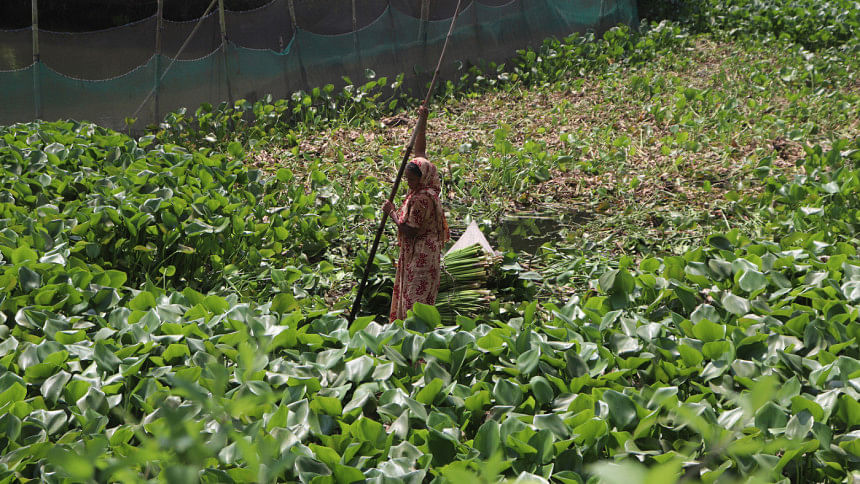Water hyacinth spurs new livelihoods

Earning opportunities through water hyacinth have been created for hundreds of people in different areas of Pirojpur's Nazirpur and neighbouring Gopalganj's Kotalipara upazilas.
Locals, especially from low-income families, are now making money by selling dry stalks of the plant.
Fibres from these dry stalks are used to make various decorative household items, handbags, plate mats and other artisan products at different factories across the country, particularly in Rangpur.
The year-round trade of dry water hyacinth stalks began around three to four years ago in Manoharpur village of Nazirpur upazila. The peak season starts at the end of winter and continues until the monsoon sets in.
Men, women and even children are involved in collecting the plant. They sell the dry stalks to wholesale buyers at Tk 50–55 per kilogramme, depending on quality. The buyers then transport the stalks to factories for further processing.
Rahila Begum, who has been selling dry stalks of water hyacinths for around three years, said with her earnings she was able to buy four goats.
"I also help my sons financially with my earnings," she said.
Ranjuara Begum, another woman involved in the trade, said after completing household chores, they collect stalks from the marshland around their home.
"Normally I can collect enough to make five kilogrammes of dry water hyacinth stalks daily," she said.
Azizul Fakir, a wholesale buyer, said, "I collect dry stalks of water hyacinth from four to five villages under Nazirpur and Kotalipara upazilas."
He said he can transport three to four tonnes of stalks weekly.
Local Ripon Fakir said a huge quantity of water hyacinth grows naturally in the marshlands of their village.
"We collect the long stalks using small boats and sell those after processing," he said.
He said drying the raw stalks takes between five and ten days, depending on the weather. In summer, drying takes four to five days, while in monsoon it may take two to three times longer.
"One can earn Tk 400–500 daily by collecting stalks," said local Bipul Halder. "But we usually collect them in our free time."
"This business is a blessing for us," said another local, Supen Halder. "It helps us earn extra money by selling something that grows naturally around us."
Dolon Chandra Roy, Gopalganj's Kotalipara upazila agriculture officer, said water hyacinth hampers normal activities, as it blocks canals and disrupts communication via waterbodies.
"Most often, people have to clean these water hyacinths by themselves to ease water communication and cultivate Boro paddy," he said.
"But now, many people in my upazila are earning money by selling dry stalks of water hyacinths, and it is a good initiative," he added, saying it poses no negative effect on the environment and biodiversity.

 For all latest news, follow The Daily Star's Google News channel.
For all latest news, follow The Daily Star's Google News channel. 



Comments